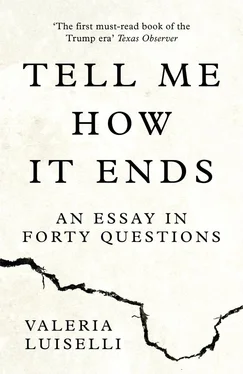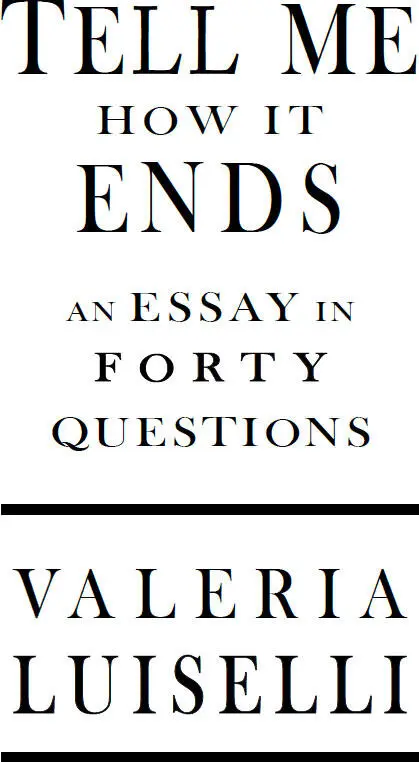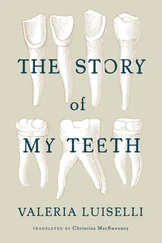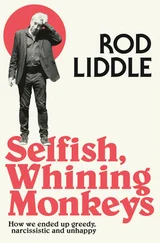
Copyright Copyright Introduction I. Border II. Court III. Home IV. Community Coda (Eight Brief Postscripta) Acknowledgments Sources About the Authors About the Publisher
4th Estate
An imprint of HarperCollins Publishers
1 London Bridge Street
London SE1 9GF
www.4thEstate.co.uk
This eBook first published in Great Britain by 4th Estate in 2017
Copyright © Valeria Luiselli 2017
Introduction © 2017 by Jon Lee Anderson
Selected translations from the Spanish edition © 2017 by Lizzie Davis
Book design by Connie Kuhnz
Valeria Luiselli asserts the moral right to be identified as the author of this work
A shorter version of this essay was originally written in English and appeared in Freeman’s in 2016. The author then rewrote the essay in Spanish and, while doing so, expanded upon it. That version was published as Los niños perdidos (Un ensayo en cuarenta preguntas) by Sexto Piso in 2016. The new sections of the essay were translated into English by Lizzie Davis, in consultation with the author.
A catalogue record for this book is available from the British Library
All rights reserved under International and Pan-American Copyright Conventions. By payment of the required fees, you have been granted the non-exclusive, non-transferable right to access and read the text of this e-book on-screen. No part of this text may be reproduced, transmitted, down-loaded, decompiled, reverse engineered, or stored in or introduced into any information storage and retrieval system, in any form or by any means, whether electronic or mechanical, now known or hereinafter invented, without the express written permission of HarperCollins
Source ISBN: 9780008271923
Ebook Edition © August 2017 ISBN: 9780008271930
Version: 2017-08-14
Contents
Cover
Title Page
Copyright Copyright Copyright Introduction I. Border II. Court III. Home IV. Community Coda (Eight Brief Postscripta) Acknowledgments Sources About the Authors About the Publisher 4th Estate An imprint of HarperCollins Publishers 1 London Bridge Street London SE1 9GF www.4thEstate.co.uk This eBook first published in Great Britain by 4th Estate in 2017 Copyright © Valeria Luiselli 2017 Introduction © 2017 by Jon Lee Anderson Selected translations from the Spanish edition © 2017 by Lizzie Davis Book design by Connie Kuhnz Valeria Luiselli asserts the moral right to be identified as the author of this work A shorter version of this essay was originally written in English and appeared in Freeman’s in 2016. The author then rewrote the essay in Spanish and, while doing so, expanded upon it. That version was published as Los niños perdidos (Un ensayo en cuarenta preguntas) by Sexto Piso in 2016. The new sections of the essay were translated into English by Lizzie Davis, in consultation with the author. A catalogue record for this book is available from the British Library All rights reserved under International and Pan-American Copyright Conventions. By payment of the required fees, you have been granted the non-exclusive, non-transferable right to access and read the text of this e-book on-screen. No part of this text may be reproduced, transmitted, down-loaded, decompiled, reverse engineered, or stored in or introduced into any information storage and retrieval system, in any form or by any means, whether electronic or mechanical, now known or hereinafter invented, without the express written permission of HarperCollins Source ISBN: 9780008271923 Ebook Edition © August 2017 ISBN: 9780008271930 Version: 2017-08-14
Introduction
I. Border
II. Court
III. Home
IV. Community
Coda (Eight Brief Postscripta)
Acknowledgments
Sources
About the Authors
About the Publisher
I n Tell Me How It Ends there are no answers, only more questions. In this urgent, haunting, exquisitely written little book, the questions asked by Valeria Luiselli are her own, her children’s, and those she finds on the questionnaire drawn up by immigration attorneys for the tens of thousands of Central American children who arrive in the United States each year after being smuggled across Mexico to the U.S. border. These children are the most vulnerable members of an ongoing exodus of Central Americans fleeing poverty and violence in their shattered nations in the expectation of finding a better life in the United States. Many of the children are raped, robbed, or even killed along the way.
As a Mexican woman living in the United States, facing her own travails with the immigration service for a green card that would grant her U.S. residency and permission to work, Luiselli became transfixed by the surge of child refugees during the summer of 2014. She began working as an interpreter with an immigration court in New York City, where she was given the task of assisting the children with the intake questionnaire, asking its questions of them in Spanish and then translating their answers. Depending on those answers, they might or might not be granted legal sanctuary of some sort—and thus a future—in the United States. Luiselli soon realized it was impossible to fit the children’s lives neatly into the boxes provided, observing, “The children’s stories are always shuffled, stuttered, always shattered beyond the repair of a narrative order. The problem with trying to tell their story is that it has no beginning, no middle, and no end.”
The result of Luiselli’s experience is this book, in which the questions posed to the refugee children become catalysts for her own questions about the nature of family, childhood, and community, and above all, about national identity and belonging. She offers a fascinating rumination on the complex nature of the attraction of the United States for the refugee children and their families—and even for herself—despite its unwelcoming nature, casual racism, and official disinterest in their very existence. “Before coming to the United States, I knew what others know: that the cruelty of its borders was only a thin crust, and that on the other side a possible life was waiting,” she concludes. “I understood, some time after, that once you stay here long enough, you begin to remember the place where you originally came from the way a backyard might look from a high window in the deep of winter: a skeleton of the world, a tract of abandonment, objects dead and obsolete. And once you’re here, you’re ready to give everything, or almost everything, to stay and play a part in the great theater of belonging.”
Luiselli’s book appears during an especially raw juncture in the relationship between her birthplace, Mexico, and her adoptive home, the United States. During the 2016 U.S. presidential election campaign, the nature of the relationship between the two countries became an essential plank in the candidacy of Republican billionaire Donald Trump, who notoriously referred to Mexicans as unwelcome intruders, as “criminals, drug dealers, and rapists” and called for a wall to be built along the border, one that, in an apparent effort to be as humiliating as possible, he insisted “Mexico will pay for.”
Читать дальше














